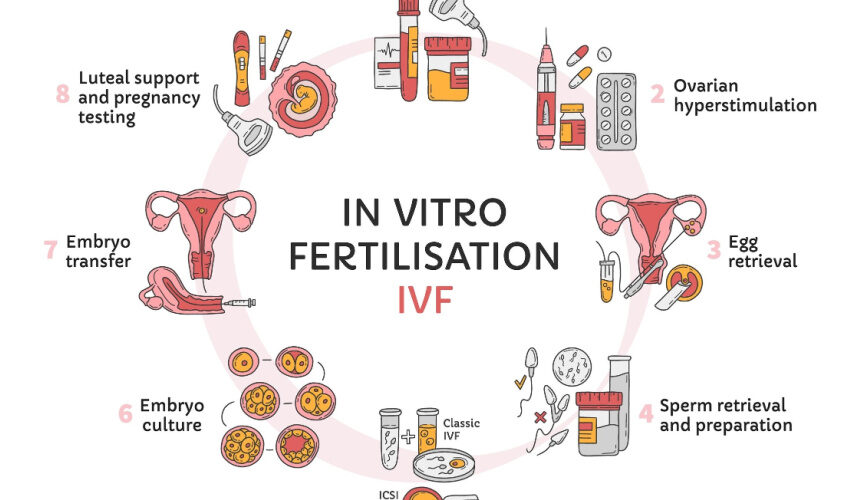It’s a Challenging Journey: What Are the Chances of IVF Success?
In vitro fertilization (IVF) represents a significant advancement in reproductive medicine, providing a promising solution for the numerous couples confronted with infertility issues. This technology has revolutionised the process of family formation and instilled newfound optimism among individuals and couples aspiring to embrace parenthood. But what are the chances of IVF success?
It is essential to recognise that the journey toward achieving IVF success is complex and intricate. A comprehensive understanding of the diverse factors that substantially impact the likelihood of attaining positive results is imperative.
A Brief Overview of IVF Treatment
In vitro fertilization (IVF) is an established fertility treatment method encompassing well−defined stages. These stages include ovarian stimulation, egg retrieval, laboratory fertilisation, embryo culture, and subsequent transfer of embryos into the uterus.
Following the collection of eggs, they are subjected to laboratory fertilisation (combined with sperm outside the body). The resultant embryos are placed within a specialised incubator, providing optimal conditions for their growth and development over several days.
Skilled embryologists meticulously evaluate embryos throughout this period, examining their quality and viability.
Subsequently, the highest−quality embryos are selected for transfer into the woman’s uterus. Following this critical step, a period of anticipation commences, during which the woman may receive hormonal support to enhance the chances of successful implantation.
Several weeks later, a pregnancy test is conducted to determine the success of the IVF cycle.
Pre−IVF Preparation
It is crucial to prioritise measures that maximise the probability of achieving favourable results before commencing an IVF process. The significant pre−IVF preparation encompasses lifestyle adjustments, comprehensive fertility evaluations, and efficient management of underlying medical conditions.
Adopting a proactive approach toward augmenting reproductive wellbeing can significantly enhance the prospects of attaining a successful outcome through IVF.
If you are wondering what are the chances of IVF success, it is important to remember that a lot of the responsibility for success will relate to the preparation you make including healthy eating, appropriate exercise and fresh air.
Factors Influencing IVF Success Rates
Age:
The impact of age on the success rates of in vitro fertilisation cannot be understated, as it stands out as one of the foremost influential factors in this domain.
Women under 35 generally have higher success rates, as their eggs are typically of better quality and have a higher chance of implantation.
As women age, the quantity and quality of their eggs decline, reducing the likelihood of successful implantation and pregnancy.
Reproductive History:
A woman’s reproductive history is crucial to IVF success. Previous pregnancies, live births, or successful in vitro fertilisation cycles indicate a higher chance of success in subsequent attempts.
However, individuals with a history of recurrent miscarriages or failed IVF cycles may experience lower success rates.
Sperm Quality:
The quality of the male partner’s sperm is crucial to IVF success. Poor sperm quality, such as low sperm count, motility, or abnormal morphology, can significantly impact the chances of successful fertilisation and embryo development.
Underlying Medical Conditions:
The attainment of favorable outcomes in vitro fertilisation can be intricately linked to distinct medical conditions present, such as polycystic ovary syndrome (PCOS), endometriosis, and uterine abnormalities. These conditions may interfere with ovulation, implantation, or the overall environment for embryo development.
Lifestyle Factors:
Lifestyle factors, including smoking, excessive alcohol consumption, obesity, and a sedentary lifestyle, can negatively impact IVF success rates. Maintaining a healthy lifestyle and weight can improve the chances of a successful pregnancy.
Embryo Quality:
The quality of embryos produced during IVF is crucial for success. A higher number of cell embryos, regular cell division, and minimal abnormalities have a better chance of implantation.
Embryo selection and transfer are vital in optimising the chances of success.
Understanding the Statistics
Success rates vary depending on individual circumstances and the specific clinic or fertility center and are often presented as the percentage of live births per IVF cycle or embryo transfer. Age, reproductive history, and the clinic’s expertise can significantly influence these rates.
While success rates continue to improve with advancements in technology and medical expertise, it is essential to manage expectations. Even with the best possible care, in vitro fertilisation does not guarantee a successful pregnancy in every attempt. It may require multiple cycles for some individuals to achieve their desired outcome.
Emotional Wellbeing
The emotional aspect of the IVF journey is often overlooked but plays a significant role in overall well−being and success. This factor covers the importance of emotional support, coping strategies, and seeking professional counselling or support groups.
Nurturing resilience and maintaining a positive mindset can help individuals navigate the highs and lows of IVF, ultimately improving their chances of success.
The Role of Fertility Clinics
Fertility clinics are essential for maximising IVF success. These centres provide crucial support, advanced reproductive technologies, and personalised treatment plans. With expert guidance, they increase the likelihood of overcoming fertility challenges and fulfilling the dream of parenthood.
Exploring Alternatives
By considering different treatment options, such as using donor eggs or embryos, exploring genetic testing, or trying various protocols, couples can increase their chances of achieving a successful outcome. You must collaborate with fertility specialists to explore these options and make informed decisions.
Conclusion
IVF provides hope and the potential for parenthood to those facing fertility challenges. However, it is crucial to remember that in vitro fertilisation success rates are individualised, and each person’s journey is unique.
While statistics provide an overview, they do not capture the personal circumstances and experiences of those undergoing IVF.
With the assistance of a reputable fertility clinic such as the International Fertility Group, individuals can receive the necessary support, guidance, and perseverance to transform their aspirations of starting or expanding a family into reality using in vitro fertilisation.

